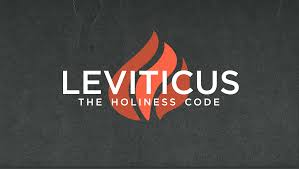The Holiness Code
17:1 to 26:46

It has long been recognized that Leviticus Chapter 17 begins a new section that addresses the everyday affairs and ethics of the Israelite community. And yet, the preceding contents of Leviticus Chapters 1-16 are presumed throughout. In scholarly literature, Leviticus Chapters 17-26 has been called the Holiness Code because of its demand for holiness on the part of the Israelites (19:2; 20:7-8 and 26; 21:6, 8, 15 and 23; 22:9, 16 and 32). As will be illustrated throughout this section, holiness addresses every aspect of life. That such an ethical or practical section would immediately follow the legislation for atonement is not surprising since this is often the pattern in biblical revelation, particularly in the B’rit Chadashah. Although the dominant theme of Leviticus Chapters 1-16 might be encapsulated by the word atonement, the dominant word for the rest of the book is holiness.
In the TaNaKh as in the B’rit Chadashah, a love for holiness and a desire to obey ADONAI are evidence of spiritual life. Holiness is especially to be demonstrated in relationship to other people. Leviticus Chapters 1-16 deals primarily with the issue of the proper relationship that is to exist between Isra’el and Ha’Shem; that is, how Isra’el is to love God with all its soul, mind and strength (see the commentary on Deuteronomy, to see link click Bw – Sh’ma Isra’el). Leviticus Chapters 17-26, on the other hand, focuses primarily on how people are to remain in fellowship with each other. Thus, the Holiness Code is a commentary on the Golden Rule (see the commentary on The Life of Christ Dv – Ask and It Will Be Given to You; Seek and You Will Find; Knock and the Door Will Be Opened to You).
Whereas the contents of the previous sections were addressed to Moshe and Aaron, beginning with Leviticus 17, the LORD addresses the Israelite community at large. The only exception is the priestly instructions of 21:1 to 22:33. Yet even there the theme of holiness for the nation is still dominant because the holiness of the priesthood was vital in maintaining the holiness of the nation at large.
Another distinct feature of Leviticus Chapters 17-26 is that YHVH addresses the nation in the first person, particularly in the phrase: I am ADONAI your God. These words link the revelation of the divine will to the covenant at Mount Sinai (see the commentary on Exodus Di – I Am the LORD, Who Brought You Out of the Land of Slavery), the introduction to the mitzvot of Isra’el. The expression also calls for a divine urgency on the part of Isra’el to comply with those commands. The phrase: I am ADONAI your God is the final, most complete, and sovereign sentence of all Scripture, without exception.292



Leave A Comment